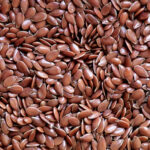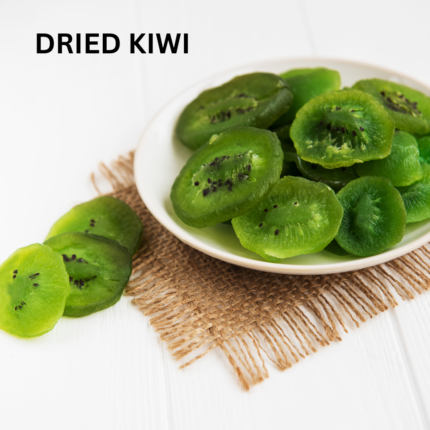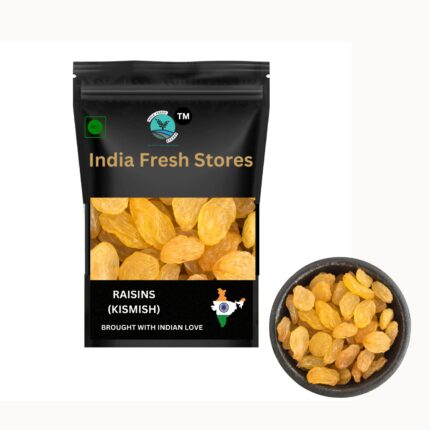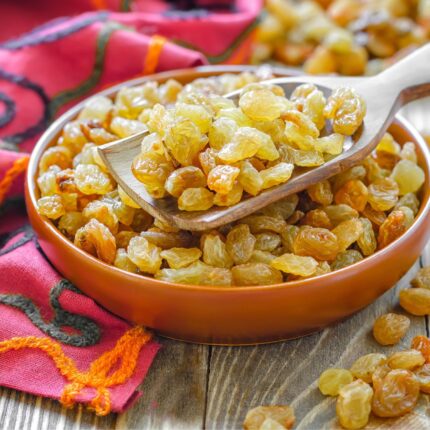Dried Fruits
Anjeer
Anjeer, or figs, are a nutritious and delectable fruit with a host of health benefits. These sweet, teardrop-shaped gems are rich in essential nutrients, such as dietary fiber, vitamins, and minerals. Figs are particularly praised for their digestive benefits due to their high fiber content, which aids in regular bowel movements and prevents constipation.
Apricots
Apricots, those small, golden-hued fruits, offer a wide range of health benefits that make them a delightful addition to one’s diet. Packed with essential vitamins and minerals, apricots are a rich source of vitamin A, which is crucial for maintaining healthy vision, skin, and immune system function.
Dried Kiwi
Dried kiwi, like fresh kiwi, offers several health benefits due to its nutritional content. Here are some of the potential benefits of eating dried kiwi:
- Rich in Nutrients: Dried kiwi is a concentrated source of essential nutrients, including vitamin C, vitamin K, vitamin E, potassium, and dietary fiber. These nutrients are important for overall health and well-being.
- Immune Support: Kiwi is well-known for its high vitamin C content, which is essential for a healthy immune system. Consuming dried kiwi can help boost your body’s defenses against infections and illnesses.
- Digestive Health: The dietary fiber in dried kiwi promotes digestive health by supporting regular bowel movements and preventing constipation. Fiber also helps maintain a healthy gut microbiota, which is important for overall digestive function.
- Heart Health: Potassium, an electrolyte found in dried kiwi, plays a role in regulating blood pressure levels and supporting heart health. Additionally, the fiber and antioxidants in kiwi may help reduce the risk of heart disease by lowering cholesterol levels and improving blood vessel function.
- Antioxidant Properties: Dried kiwi contains antioxidants such as vitamin C and polyphenols, which help neutralize harmful free radicals in the body. Antioxidants protect cells from oxidative damage and may reduce the risk of chronic diseases like cancer and heart disease.
- Eye Health: The vitamin C and vitamin E content in dried kiwi may contribute to eye health by protecting against age-related macular degeneration and other eye conditions.
- Skin Health: Vitamin C is essential for collagen synthesis, which is important for maintaining healthy skin. Consuming dried kiwi may help promote collagen production, leading to improved skin elasticity and reduced signs of aging.
- Weight Management: Dried kiwi is a low-calorie snack option that can be included in a balanced diet for weight management. Its natural sweetness can satisfy cravings for sugary snacks while providing essential nutrients and fiber.
- Bone Health: Vitamin K, found in dried kiwi, plays a role in bone metabolism and may help improve bone density and reduce the risk of osteoporosis.
- Energy Boost: The natural sugars in dried kiwi provide a quick source of energy, making it a convenient snack for fueling workouts or combating fatigue during the day.
However, it’s essential to consume dried kiwi in moderation, as it is more calorie-dense than fresh kiwi due to its concentrated sugars. Additionally, some dried kiwi products may contain added sugars or preservatives, so it’s important to check the ingredients list when purchasing.
Prunes
Prunes, dried plums, are a nutrient-dense fruit renowned for their numerous health benefits. High in dietary fiber, prunes are particularly known for their digestive advantages. They help regulate bowel movements, alleviate constipation, and promote a healthy gut.
Raisins-Kismish
₹199.00 – ₹299.00- Rich in Nutrients: Despite their small size, raisins are packed with essential nutrients such as vitamins, minerals, and antioxidants. They contain significant amounts of vitamins B6 and K, as well as minerals like iron, potassium, and calcium.
- Dietary Fiber: Raisins are a good source of dietary fiber, both soluble and insoluble. This fiber content supports digestive health by promoting regular bowel movements, preventing constipation, and aiding in digestion.
- Antioxidant Properties: Raisins are rich in antioxidants such as polyphenols, flavonoids, and phenolic acids. These compounds help to neutralize harmful free radicals in the body, thereby reducing oxidative stress and inflammation, which are linked to various chronic diseases.
- Heart Health: The antioxidants and fiber in raisins contribute to heart health. They can help lower levels of LDL (bad) cholesterol, reduce inflammation in the arteries, and improve overall cardiovascular function. Potassium in raisins also helps regulate blood pressure levels.
- Bone Health: Raisins contain calcium, which is essential for maintaining strong and healthy bones. Additionally, they contain boron, a trace mineral that aids in calcium absorption and bone formation, thus promoting bone health and reducing the risk of osteoporosis.
- Energy Boost: Raisins are a concentrated source of natural sugars, particularly glucose and fructose, which provide a quick and easily accessible energy boost. They are often consumed by athletes and individuals engaging in physical activities to replenish energy stores.
- Weight Management: Despite being relatively high in calories due to their sugar content, raisins can be included in a balanced diet as a satisfying snack. Their fiber content helps promote feelings of fullness, reducing overall calorie intake and aiding in weight management when consumed in moderation.
- Dental Health: While raisins are sweet, they don’t contribute to tooth decay in the same way as refined sugars do. In fact, certain compounds in raisins, such as oleanolic acid, have been found to inhibit the growth of oral bacteria that cause cavities and gum disease.
- Skin Health: The vitamins and antioxidants in raisins contribute to healthy skin. Vitamin C promotes collagen production, while vitamin E and beta-carotene protect the skin from damage caused by UV radiation and environmental pollutants.
Overall, raisins are a nutritious and versatile snack that can be enjoyed on their own, added to trail mixes, oatmeal, salads, or used in baking and cooking. However, it’s important to consume them in moderation due to their calorie and sugar content.






 Flax
Flax




